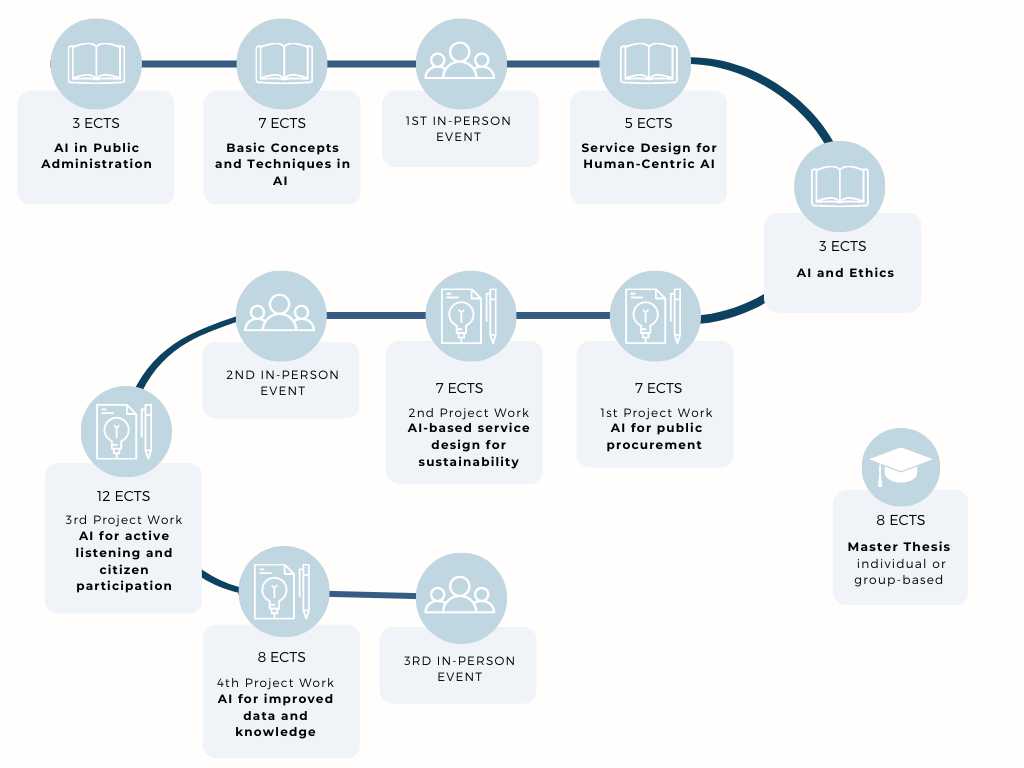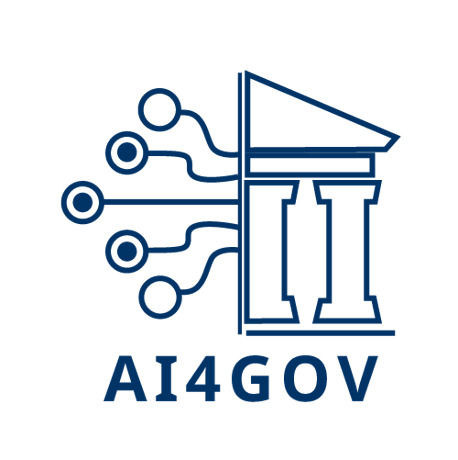We also expect to have three gatherings in three different European cities: at the beginning of the course - October 2023 - with the objective of letting students know each other and perform team-building exercises, as well as knowing some of the AI4Gov alumni; at the end of the first practical project - February 2024 -, when the AI4Gov Conference will take place; and a last one at the end of the Master programme - June 2024 -, for further discussions and for the graduation ceremony.
Master Structure

To earn a Master in Artificial Intelligence for Public Services, you must successfully complete 4 courses, 4 project-based group activities and a Master thesis (60 ECTS total), including:
Introductory Course 1. AI in Public Administration
(3 ECTS, 2 weeks)
You will learn what AI is and is not, how AI can be applied for the digital transformation of the public sector, and which are the steps that need to be taken for the creation and deployment of AI-based public services. You will see examples of success stories from different types of public administrations and talk to some of those who were responsible for them. And you will get an initial introduction of how you can move from an organisation-centric creation of public services to a user-centric one.
Foundational Course 1. Basic Concepts and Techniques in AI
(7 ECTS, 5 weeks)
You will get a complete overview of the different types of techniques that are being used for the development and deployment of AI-based services (in the public sector and in industry). You will learn to differentiate between different types of knowledge, you will learn the main techniques that are used for knowledge representation, for data mining, for machine learning and for deep learning, and the different groups of tasks that can be solved with all these techniques, and when each of them are applicable. You will also learn about data visualisation techniques and other creative approaches to deal with data, and how to analyse existing systems and services using AI.
Foundational Course 2. Service Design for Human-Centric AI
(5 ECTS, 4 weeks)
You will learn how to co-design AI-based public services with different stakeholders. You will become familiar with the entire design cycle, from problem setting and framing to idea generation, solution development, and prototyping of concepts for testing. You will understand participatory processes from a design perspective, and learn where AI can be relevant. You will work throughout all the steps of co-design of a complete service, so as to have practical hands-on experience on how this process works.
Foundational Course 3. AI and Ethics
(3 ECTS, 3 weeks)
Virtually every AI professional will have to cope with legal and ethical issues during his or her professional career. You will learn how to apply practical and theoretical tools to address these issues. In particular, you will be given some general notions on the legal framework in Europe of AI, necessary to avoid breaching the law and necessary to exercise our rights. Specific focus will be made both on ‘privacy and data protection’, including practical cases around the EU GDPR (General Data Protection Regulation) and the upcoming Regulation on AI, on intellectual property and copyright regulation, including practical examples on data licenses and open data policies.
Project 1. AI for public procurement
(7 ECTS, 4 weeks)
You will learn about how to apply natural language processing and classification techniques to public procurement data, from Europe and from your own countries, so as to improve the procurement of services or to fight corruption. You will also go deeper into the consequences in terms of the AI regulation and on Open Data requirements.
Project 2. AI-based service design for sustainability
(7 ECTS, 4 weeks)
You will learn more about user-centered design, eXplainable AI and prediction mechanisms that can be used to make our society (and public services) more sustainable. You will also go in-depth of prototyping techniques for digital platforms and experience ways to account for the point of view of the user. You will also practice on how to include co-design activities in the tenders associated to the procurement of these types of services.
Project 3. AI for active listening and citizen participation
(12 ECTS, 6 weeks)
You will experience the entire project cycle, combining the design approach explored in Module 3 with the selection/adoption of specific AI techniques seen in Module 2. You will follow the entire process from challenge definition, identification of needs, focus on technological possibilities and solutions, idea elicitation, solution definition.
You will get more in-depth knowledge about natural language processing techniques. Inspired by existing work on public participation and deliberation processes, you will learn more about decision making, predictive methods (forecasting and scenario-based design) and governance. You will also learn how to include clauses in tenders related to the quality of the results obtained and related to anonymisation processes. You will also go deeper into those aspects related to the ethics of interacting with citizens and processing those interactions. And you will learn about how to request and evaluate the quality of the solutions when procuring these types of services.
Project 4. AI for improved data and knowledge governance
(8 ECTS, 4 weeks)
You will learn the techniques that can be used to govern all the public data more efficiently in the context of data spaces, using knowledge graph and data integration technologies. You will also learn about the importance of metadata management, and how to ensure that the results of your procurement processes turn into open data for the benefit of society and further public service development.
Master thesis
(9 ECTS)
This last project will allow students to propose and work, individually or in groups, on a use case that they would be interested in, based on their real experiences and needs. Mentors will be assigned to each individual or group, to help during the work in the project. The final delivery will be the Master thesis. There will be also a final event where we will held the graduation ceremony.
Hands-on group-based projects
A large part of the programme is based on the idea of having you as students working in multidisciplinar-multicultural groups towards the design of public services that use different types of AI techniques, as discussed above.
We have selected 4 predefined topics and AI and service-design focus areas for each of them, so that students will get a comprehensive insight of types of problems that can be addressed with AI solutions and types of approaches that may be taken to design services for them.
These group-based projects will be structured around 4-6 weeks of work, where each group will have a mentor assigned, who will drive the group towards the achievement of the solutions, The following work will be done each week, with checkpoints on every common session:
- Week 1. Setting the objectives, understanding/framing the problem, understanding user/ context /technology (i.e., data available, barriers, limits, feasibility of applying AI, user needs, organisation needs, …)
- Weeks 2-3. Extract insights from the research, reframe the problem, define design opportunities; go in depth into some of the AI techniques that can be used; idea generation.
- Weeks 3-4-5. Initial idea iteration/prototyping, basic design of the solution, ethics consideration.
- Weeks 4-5-6. Refinement, basic implementation, implications in procurement of solutions, final presentations.
The final project will be open so that we can collectively, and for each group, decide on the topic to be addressed, based on existing experiences or current or future needs by the members of the groups, and generate the Master thesis individually or in groups.
